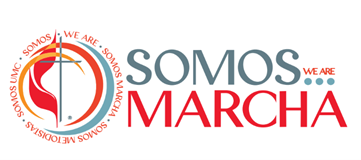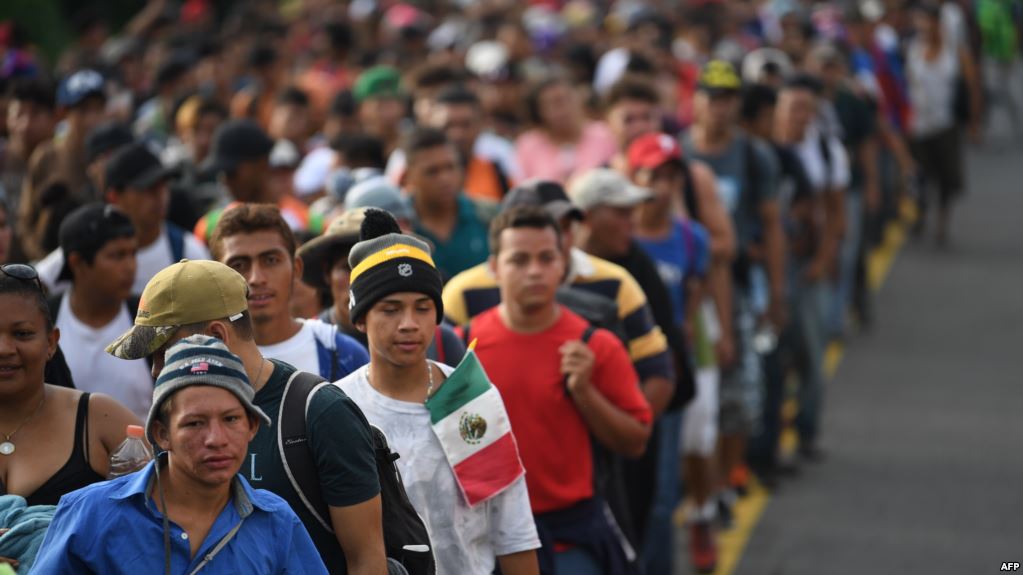Joint Statement in Response to the Central American Migrant Caravans
Human migration is as old as human history. Individuals, families, tribes, and nations have been on the move since the days of Abraham and Sarah and before. Throughout the centuries, political and economic factors, including wars; health and environmental challenges; and racism, xenophobia, and religious discrimination have at times uprooted people and at others lured them to new venues across deserts, rivers, continents, oceans, and national and ethnic boundaries.
Today, migration is a critical international and at times a pressing national issue; a matter of last resort and no other choice for millions of human beings, and a desperate alternative to many who would rather stay where they are if conditions could permit safety and essentials for survival. In general terms, migrants today are those who by force or choice leave their regions of origin because of armed conflict, natural disaster, institutional or gang violence, development projects, human trafficking (including labor, sexual or drug trafficking) or extreme economic deprivation. (Resolution of The United Methodist Church: Global Migration and the Quest for Justice)
These wise words describe what we see happening through the human caravan that began on October 12, 2018 with 160 brave souls who gathered and together began to journey as the migrants of old. From Honduras to Guatemala and now to Mexico they have supported each other in their common suffering. This caravan has grown to 7,000 and the latest reports is that these 7,000 have now formed 3 distinct caravans traveling across Mexico. More than half of them are girls and women. They did not want to leave their homes, but because of deadly poverty and violence, found themselves being forced to journey from death toward what they perceived to be their last hope for life. Some have sought asylum in Mexico while others continue to travel to the U.S. to request asylum in this country.
These migrant sisters and brothers have been villainized, yet as we have sought to minister to them along their perilous journey, what we have seen on the whole is human beings of great courage and deep faith who have placed their lives in God’s hands as they seek the basic necessities for life – food and shelter for their children and above all, safety from those who seek to do them harm. Their faith in God has strengthened our faith, and their human suffering has convicted our souls that we must accompany them and seek to advocate for their safety and their rights.
We stand together in demanding that the governments of our countries treat these migrants in ways that recognize and respect their God-given humanity, and with compassion and dignity.
While we respect the laws of our countries, we question whether the very laws, particularly the asylum laws of our countries, are fully being implemented in the cases of the migrants traveling in these caravans. We call for the fair and just implementation of the asylum laws of our countries, and for all of us to be vigilant voices for the rights of migrants.
Furthermore, we call upon President Donald Trump to cease characterizing our migrant brothers and sisters in derogatory and fear-inducing ways, castigating them as criminals when in fact they have the right under International Law to seek asylum. As the leader of the most powerful and wealthiest nation in the world, we call him forth to lead with truth, justice and moral compassion.
Above all, we call upon our congregations to be agents of God’s mercy toward the migrant. We are inspired by Methodist congregations and other communities of faith and compassion who throughout the journey of these migrants have taken some into their homes, fed them in their congregations, and blessed them on their way. As the Bishops of the Methodist Church of Mexico have stated: As Christians we are called to receive those who migrate as if receiving Jesus Christ himself. Treat them as if they were our own families, help them as if we were the ones migrating, and extend love to the migrants for we know ourselves to also be a migrant people on the journey of faith (adapted from the Oct. 20, 2018 Immigration Letter of the College of Bishops of the Methodist Church of Mexico, A.R.).
Council of Bishops of The United Methodist Church
Bishop Kenneth H. Carter, President
College of Bishops of the Methodist Church of Mexico
Bishop José Antonio Garza Castro, President
Bishop Elías G. Galván, Supervising Bishop
United Methodist Mission in Honduras
Rev. Juan de Dios Peña, President
Iglesia Metodista de El Salvador
ESPAÑOL
La migración humana es tan antigua como la historia humana. Individuos, familias, tribus y naciones se han ido trasladando desde ante de los tiempos de Abraham y Sara. A lo largo de los siglos, factores políticos y económicos, las guerras inclusive; retos concernientes a la salud y al medioambiente; el racismo, la xenofobia y la discriminación religiosa a veces han desarraigado a las personas de sus lugares de procedencia, y a otras las han seducido hacia nuevos lugares a través de desiertos, ríos, continentes, océanos y fronteras nacionales y étnicas.
Hoy en día, la migración es un asunto internacional crítico y, a veces, un asunto nacional apremiante; un asunto de último recurso y de ninguna otra opción para millones de seres humanos y, una alternativa desesperada para quienes prefieren quedarse donde están si existieran las condiciones que permitieran su seguridad y lo esencial para su supervivencia. En términos generales, las personas migrantes de hoy son quienes –forzadas o por su propia elección– abandonan sus lugares de origen debido a conflictos armados, desastres naturales, violencia institucional o causada por las pandillas, proyectos de desarrollo, trata de personas (incluida la trata laboral, sexual o de drogas), o privaciones económicas extremas. (Resolución de la Iglesia Metodista Unida: La migración global y la búsqueda de justicia).
Dichas palabras sabias describen lo que vemos pasar a través de la caravana humana, la cual empezó el 12 de octubre de 2018, con 160 almas valientes quienes se reunieron y juntas comenzaron a viajar, así como lo hicieron los antiguos migrantes. De Honduras a Guatemala, y ahora hacia México, estas personas migrantes se han sostenido mutuamente en su común sufrimiento. Esta caravana ha crecido a 7,000 personas, y de acuerdo con los últimos informes, de esta cantidad se ha formado 3 caravanas que viajan a través de México. Más de la mitad de esa multitud la componen niñas y mujeres. Estas personas no quisieron abandonar sus hogares, pero debido a la pobreza y la violencia se vieron forzadas a viajar como un escape de la muerte hacia lo que consideraron su última esperanza de vida. Algunos han buscado asilo en México, mientras que otras continúan su viaje hacia EE. UU., con el fin de solicitar asilo en este país.
A estos hermanos y hermanas migrantes se les ha criminalizado. No obstante, según hemos buscado ministrarles a través de su jornada peligrosa, lo que mayormente hemos visto en estos seres humanos es una gran valentía y fe profunda, quienes han puesto sus vidas en las manos de Dios mientras buscan suplir sus necesidades básicas para su sobrevivencia: alimento y refugio para sus hijos y, sobre todo, protección de quienes buscan hacerles daño. Su fe en Dios ha fortalecido nuestra fe, y su sufrimiento ha convencido a nuestra almas de nuestro deber de acompañarlos y abogar por su seguridad y sus derechos.
Nos unimos para exigir que los gobiernos de nuestros países traten a estos migrantes de maneras que reconozcan y respeten su humanidad dada por Dios, con compasión y dignidad.
Si bien respetamos las leyes de nuestros países, nos preguntamos si estas leyes –en particular las leyes de asilo de nuestros países– están siendo cabalmente aplicadas en los casos de los migrantes que viajan en estas caravanas. Pedimos la aplicación justa y equitativa de las leyes de asilo de nuestros países y, que todos nosotros seamos voces vigilantes de los derechos de los migrantes.
Además, hacemos un llamado al presidente Donald Trump a cesar de caracterizar a nuestros hermanos y hermanas migrantes de maneras despectivas e inductoras al miedo, y los deje de penalizar como criminales, cuando en realidad tienen el derecho bajo la ley internacional de buscar asilo. Como líder de la nación más poderosa y rica del mundo, lo exhortamos a liderar con verdad, justicia y compasión moral.
Sobre todo, hacemos un llamado a nuestras congregaciones para que sean agentes de la misericordia de Dios hacia el migrante. Nos inspiran la labor y la compasión provistas por las congregaciones metodistas y otras comunidades de fe a favor de estos migrantes a lo largo de su viaje: al llevar a algunas de las personas migrantes a sus hogares; al alimentarlas en sus congregaciones, y al bendecirlas en su camino. Tal como lo han declarado los obispos de la Iglesia Metodista de México, como cristianos estamos llamados: «a recibir a quien migra como si recibieran a Jesucristo; a tratarlos como si de nuestras familias se trataran; a ayudarles como si nosotros fuéramos quienes migran, y a amar a los migrantes, porque también somos un pueblo migrante en el camino de la fe» (adaptación de la “Carta sobre la inmigración del 20 de octubre de 2018, Colegio de Obispos de la Iglesia Metodista de México”).
Concilio de Obispos de la Iglesia Metodista Unida
Obispo Kenneth H. Carter, presidente
Colegio de Obispos de la Iglesia Metodista de México
Obispo José Antonio Garza Castro, presidente
Obispo Elías G. Galván
Misión Metodista Unida en Honduras

